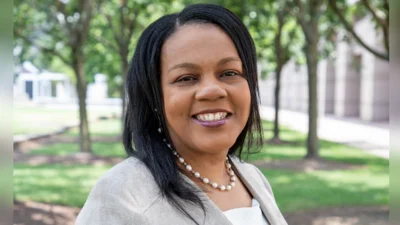Source: East Carolina University
Source: East Carolina University
East Carolina University issued the following announcement on Sept. 22.
For Purificación Martínez, associate professor of Hispanic studies and chair of the faculty at East Carolina University, voting is personal. As someone who lived under the regime of dictator Francisco Franco in Spain and remembers the first time she was able to actually vote in a democratic election, she has a profound appreciation for that right and makes sure her students understand the importance.
At election time, she always asks her students if they have registered to vote, and she said she usually has a few who say elections have no importance in their lives.
“And the feeling that I feel when I hear that is of sadness,” she said. “And I feel also determined. I need to continue to speak about the importance of voting, and I often tell them something: Do you have safe drinking water? Do you have paved roads? Can you go to a doctor and be seen? In what type of institution are you studying? You are studying in a public university.
Video Player00:0000:00
Visit YouTube for the closed-captioned version of this video.
“All those things are happening because we have a government. And in order to have a government, we need to have elections.”
Martínez said that conversation provides a starting point to talk to her students about the role of government and why democracy is important.
ECU has considered student engagement in the democratic process a priority for years, and through its efforts has earned inclusion for three years running on Washington Monthly’s list of Best Colleges for Student Voting. A variety of initiatives and organizations dedicated to bringing programming to students encouraging them to be active, responsible citizens are now centralized under the Center for Leadership and Civic Engagement’s (CLCE) Pirates Vote portal.
HOW TO
Register
Online
By mail (get form at DMV, Board of Elections offices, libraries)
Or in person at early voting sites (Oct. 15-31)
Vote
By absentee ballot (Oct. 27 deadline to request ballot; do it early)
During early voting Oct. 15-31 (any early voting site)
Or on Election Day Nov. 3 (at your precinct’s polling site)
GET MORE INFO
The #PiratesVote initiative provides a source of election and voting information as well as programming such as a political film series, opportunities for civil dialogue and a citizens’ academy that educates students about how to be responsible, engaged citizens and to inspire them to be involved in their communities and in our democracy.
CLCE works with non-partisan partners such as the Andrew Goodman Foundation and the Campus Vote Project, each of which works to empower students with the information they need to register and vote, and to reduce barriers to student voting.
Alex Dennis, assistant director in the Center for Leadership and Civic Engagement, talks to student-athletes about voting.
Alex Dennis, assistant director in the CLCE, said it’s critical to get students involved while they’re in college.
“We know that if we get them engaged as voters at 18 and 19 years old, they become lifelong voters,” he said. “The data reflects that. And so the biggest thing is to (help them) a little bit through the process at the beginning, and then hopefully they will become engaged in our democracy throughout their lives.”
In the 2016 presidential election, ECU’s turnout rate for students was 46.2%, just short of the nationwide average for college students. Dennis said CLCE’s goal for this year is for student turnout to exceed 50%. The challenge may be even more difficult since many students are no longer on campus and in-person events have had to be canceled or altered.
One change that he expects to make a positive difference is the relocation of the campus polling site to the Main Campus Student Center, which will be open during Pitt County’s one-stop early voting period starting Oct. 15. “We try to encourage students to participate in early voting because you can do same-day registration, which makes it super easy,” Dennis said.
Students who aren’t yet registered, and those who may have registered at home but are now in Greenville, can complete or change their registration information and vote at the same time.
One thing that can be difficult for students is providing proof of residency to register or to update their registration, since utility bills may be built into their apartment lease. CLCE has worked with the Pitt County Board of Elections to ensure that the university’s Banner system counts as a state document, so that students with a Pitt County address in the Banner system can register to vote in Pitt County using that as documentation.
NEED INFO ABOUT LOCAL CANDIDATES?
Dr. Cindy Elmore and Dr. Brian Massey have launched a voter information website. The site provides nonpartisan information about local candidates for offices in Pitt County. Each candidate has been invited to respond to a short questionnaire about their positions and priorities if elected. Funded by grants from the College of Fine Arts and Communication and the School of Communication, the site also provides an overview of the role and duties of each contested elected office and a link to voter registration information.
The site addresses a vital need for voter education and engagement resources. “We’re concerned about the widespread newspaper shutdowns and journalist layoffs, both of which leave voters with no one providing the information needed to engage in local elections and voting,” Massey said.
If they would rather register and vote at home, that’s fine too, Dennis said. “[Students] are the only subset of the population that has that choice,” he said.
CLCE has also worked closely with ECU athletics to encourage student-athletes to vote, including hosting a registration event with the football team in June. “We’re going to be doing some in-person voter registration and answering questions … as athletes are going back and forth from practice,” Dennis said.
The Dinner and Discourse dialogue series provides an open, safe and supportive environment to explore race and political issues within the context of individual experiences, with an opportunity for Q&A with panelists during each event. The first was Sept. 21, and additional events are scheduled for Oct. 5 and Nov. 16.
Other Pirates Vote events include virtual workshops and watch parties for the presidential and vice presidential debates and election night.
For more information visit the Pirates Vote website or email vote@ecu.edu.
Original source: https://news.ecu.edu/2020/09/22/pirates-vote/




 Alerts Sign-up
Alerts Sign-up